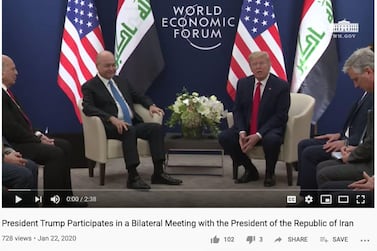The World Economic Forum on Wednesday said an initiative it is leading to plant 1 trillion trees by 2030 to reduce harmful carbon in the Earth’s atmosphere is being backed by governments and companies around the world.
A full team in Geneva is already working on the project and 200 to 300 companies have shown their interest in joining in the first 24-hours.
The impact of climate change has been high on the agenda in Davos this week with teenage activist Greta Thunberg speaking at the forum’s annual meeting.
On Tuesday in Davos, President Donald Trump said the US is backing the 1 trillion trees initiative.
That is despite Mr Trump having rolled back America’s commitment to the Paris deal to limit global warming since taking office.
Ivan Duque, President of Colombia, pledged yesterday in Davos that his country would plant 180 million trees by 2022 as part of its commitment to the programme. This will restore about 300,000 hectares of the Colombian ecosystem, he said.
The initial funding for the 1 trillion trees project is coming from Marc Benioff, the founder of $160 billion (Dh fig please) cloud computing company Salesforce, and his wife Lynne, a philanthropist in other fields such as health. The forum did not provide information on how much investment would be required to make the scheme a success.
Businesses, governments and individuals, “every one of us can make a commitment to plant trees”, Mr Benioff said.
The research underpinning the initiative has been carried out by a team led by British scientist Tom Crowther at the Crowther lab at ETH Zurich University. He had already mapped the world’s trees several years ago, learning that there were about 3 trillion and that there had been double that number of trees before the industrial revolution.
So “we published where trees could potentially exist under today’s climate … and came up with 0.9 billion hectares which is 1 trillion trees”, he said.
There is some uncertainty over the amount of carbon that could potentially be sequestered from this scheme, he said, with scientists arguing that it could be lower or higher than the 200 gigatonnes that Mr Crowther’s research suggested.
“What we are not uncertain about … whether it is 100, 300 or 200 gigatonnes [there is] a massive carbon drawdown in forests. We are all unified on that fact,” he said.
Mr Crowther’s research was inspired by the UN’s billion tree campaign, which began in 2006.
“There are three major dangers, the first is people might think [planting a trillion trees] is an excuse to stop cutting emissions. That can’t happen. The other dangers are [if you] plant in the wrong place you can destroy biodiversity …. and failing to include local communities.”
Hindou Oumarou Ibrahim, a climate change expert from Chad, said that indigenous people “are the first ones excited about” the 1 trillion trees initiative because of the importance of forests to their lives.
She says a priority is “how indigenous peoples and people living in forests can be partners and first stakeholders”.
If this is successful the benefits will not only be more forest and trees but a wider impact on society.
She mentioned the conflict in the Sahel region of Africa, “which is about resources”, and the positive impact the success of planting and conserving trees could have on potential de-escalation.
Yogi Sadhguru, of the Isha Foundation in India, said “this is a good time to reduce meat consumption, which will free up agricultural land. This area, which is private, means that trees are more likely to be conserved … Survival rates on private land are over 90 per cent.”
Legendary primatologist Jane Goodall, who has been a key inspiration for the idea behind the 1 trillion trees programme, said it is critical to “work with the people cutting down trees because they are desperate to grow food to feed their families”.
“People have [started to understand] that saving the forests is saving their own futures,” she said. “This progress will be wasted if new generations don’t understand this too.”
Ms Goodall suggested a programme to name trees to help conserve them in the same way she pioneered naming the chimpanzees that she studied.








